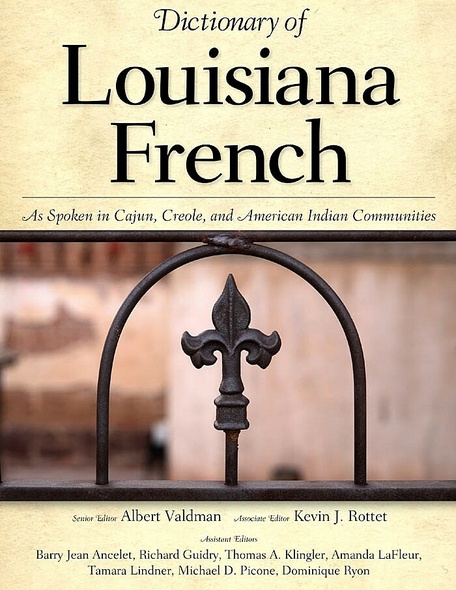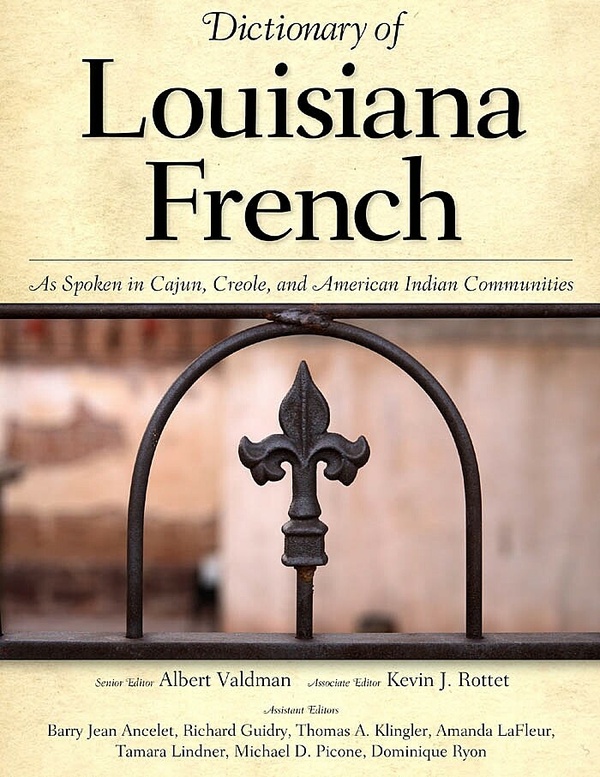Dictionary of Louisiana French
As Spoken in Cajun, Creole, and American Indian Communities
The Dictionary of Louisiana French (DLF) provides the richest inventory of French vocabulary in Louisiana and reflects precisely the speech of the period from 1930 to the present. This dictionary describes the current usage of French-speaking peoples in the five broad regions of South Louisiana: the coastal marshes, the banks of the Mississippi River, the central area, the north, and the western prairie. Data were collected during interviews from at least five persons in each of twenty-four areas in these regions. In addition to the data collected from fieldwork, the dictionary contains material compiled from existing lexical inventories, from texts published after 1930, and from archival recordings.
The new authoritative resource, the DLF not only contains the largest number of words and expressions but also provides the most complete information available for each entry. Entries include the word in the conventional French spelling, the pronunciation (including attested variants), the part of speech classification, the English equivalent, and the word’s use in common phrases. The DLF features a wealth of illustrative examples derived from fieldwork and textual sources and identification of the parish where the entry was collected or the source from which it was compiled. An English-to-Louisiana French index enables readers to find out how particular notions would be expressed in la Louisiane.
Here is a work of scholarship described by the publisher as ‘the definitive resource for understanding a distinct French dialect.’ Senior editor Valdman is the director of the Creole Institute at Indiana University, and the dictionary was subsidized by Indiana University as well as by Tulane University and the Louisiana Endowment for the Humanities, among others. The goal of the encyclopedia, as stated in the preface, is ‘to provide an inventory of the vocabulary of Louisiana French reflecting the speech of the period from 1930 to today.’ The project team drew from existing lexical studies and also conducted fieldwork within a representative sampling of Louisiana’s French-speaking communities. Archival recordings served as additional source material. All entries were vetted by project team members who are native Cajuns. Entries and subentries contain spelling variants, a phonetic transcription, part of speech, an English equivalent, examples with English translations, source codes for the examples, and codes identifying the parishes and texts where the term was found. Some entries also contain usage notes. For example, we learn that habitant (farmer) is ‘sometimes pej.’ (or pejorative). The illustrative examples make fascinating reading because many of them are based on interviews with native speakers. Among examples for mettre, some of whose definitions (translated into English) include ‘to put,’ ‘to put in,’ or ‘to put on,’ are ‘I remember my grandmother, she took newspapers to put up on the wall for wallpaper, she did that’; ‘We would make a chicken fricassee and put dumplings in it’; and ‘His legs were surely as big as my cigar, but he wore a size fourteen shoe.’ Capping off the dictionary is a substantial reverse English–Louisiana French index. As standard English-language dictionaries in print form dwindle, this volume is a superlative example of a highly specialized dictionary that definitely fills a gap. It is recommended for academic libraries with extensive linguistics collections and for both academic and large public libraries with collections related to the region. Dictionary lovers should seek it out.
Albert Valdman is Rudy Professor of French, Italian, and Linguistics (emeritus) and the director of the Creole Institute at Indiana University. He is also editor of the Haitian Creole-English Bilingual Dictionary. Kevin J. Rottet is associate professor of French linguistics and adjunct professor of linguistics at Indiana University. He is author of Language Shift in the Coastal Marshes of Louisiana and coeditor of the Dictionary of Louisiana Creole. Barry Jean Ancelet, a professor of French and Francophone studies at the University of Southwestern Louisiana, is author of many books about the French culture of southern Louisiana, including Cajun Country, Cajun and Creole Folktales: The French Oral Tradition of South Louisiana, and Cajun and Creole Music Makers: Musiciens cadiens et créoles, all published by University Press of Mississippi.






